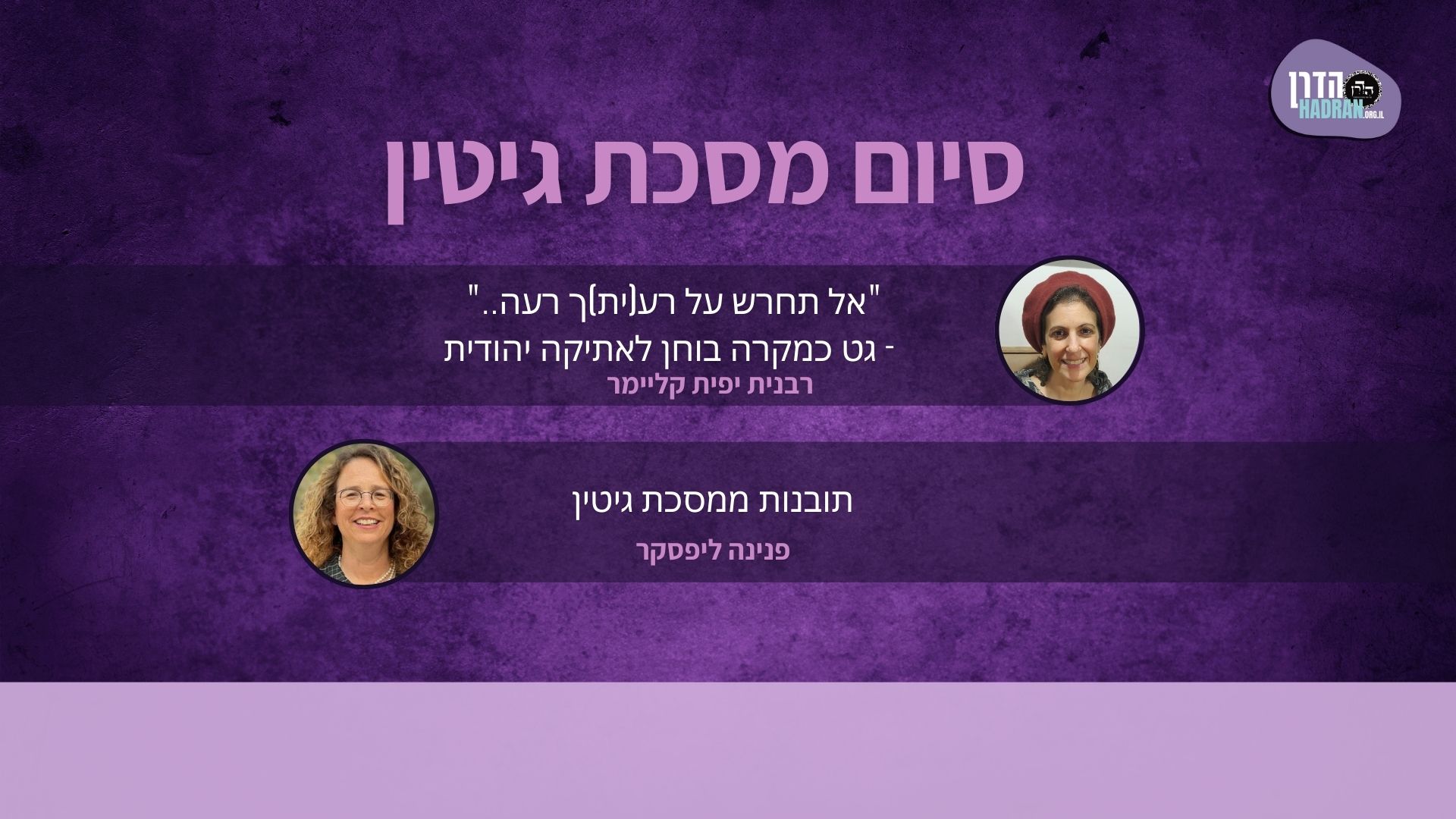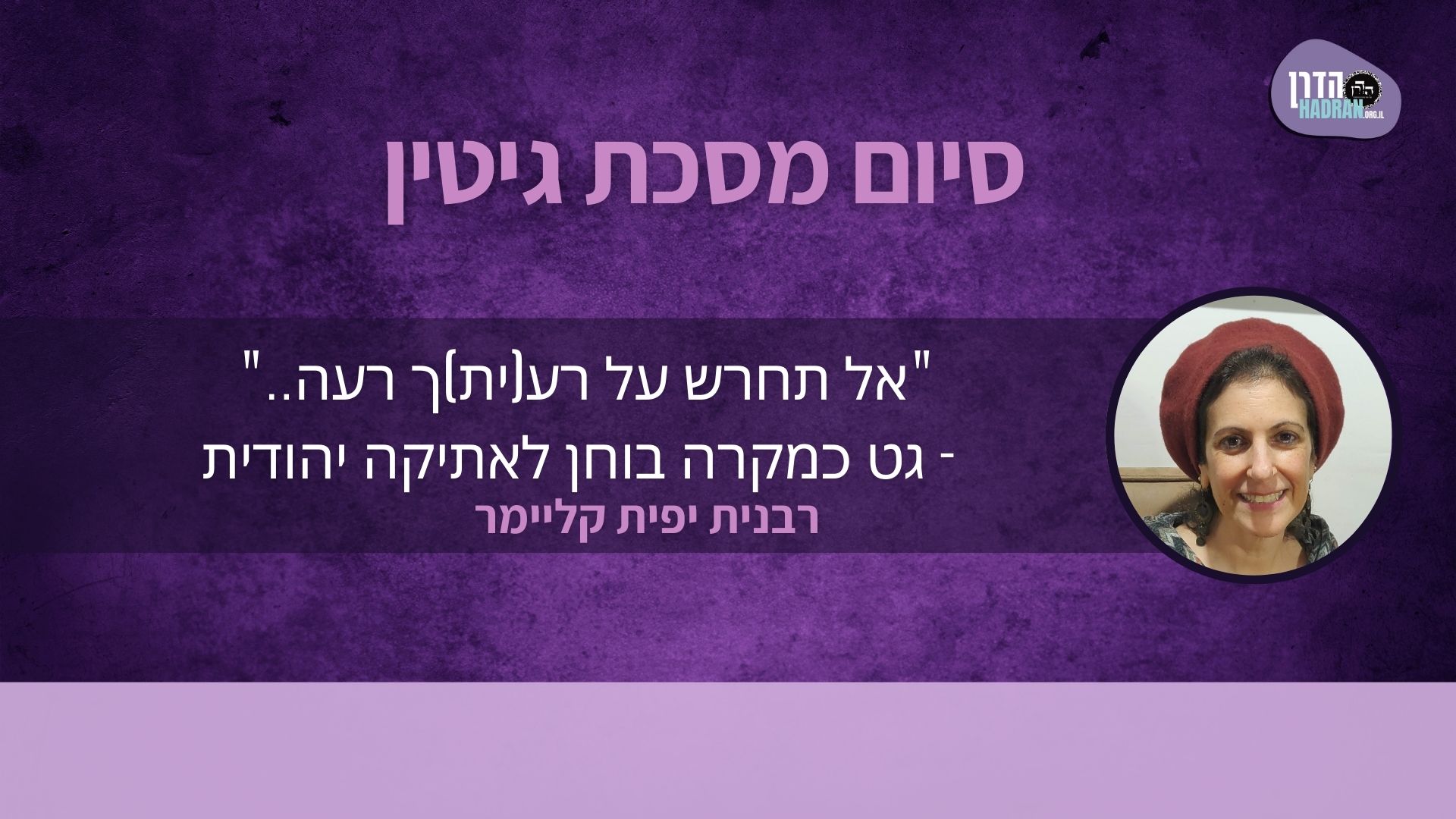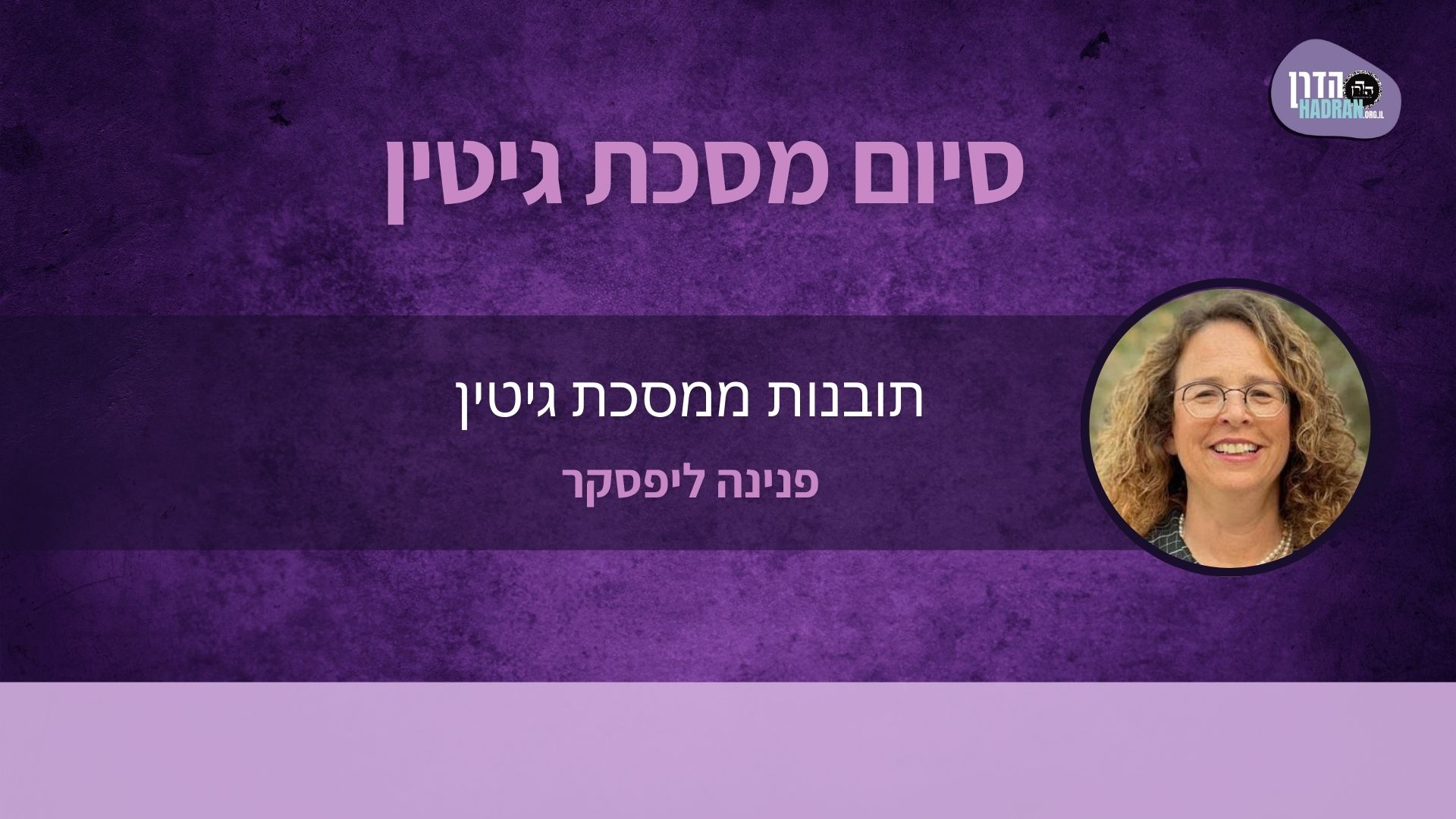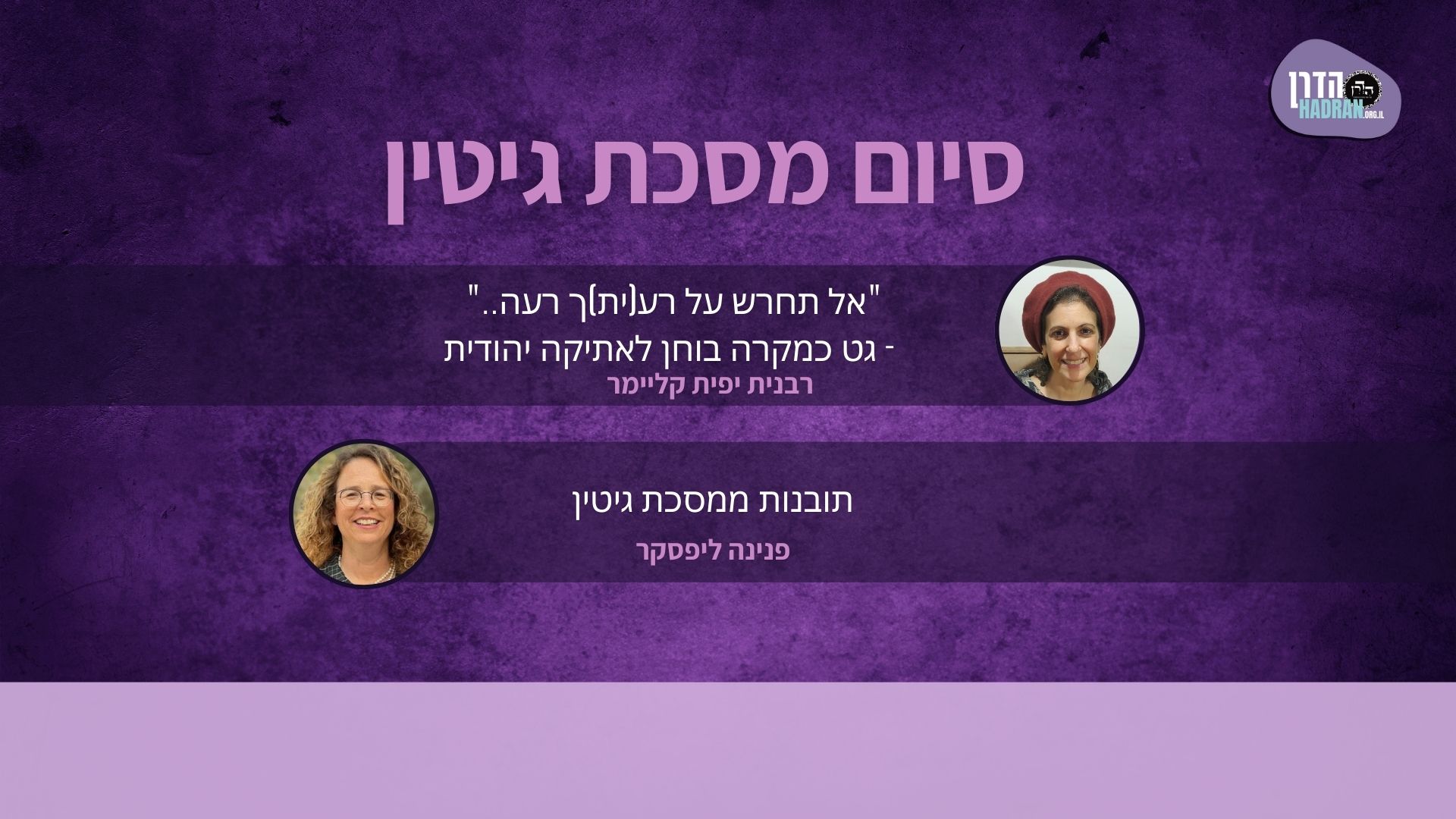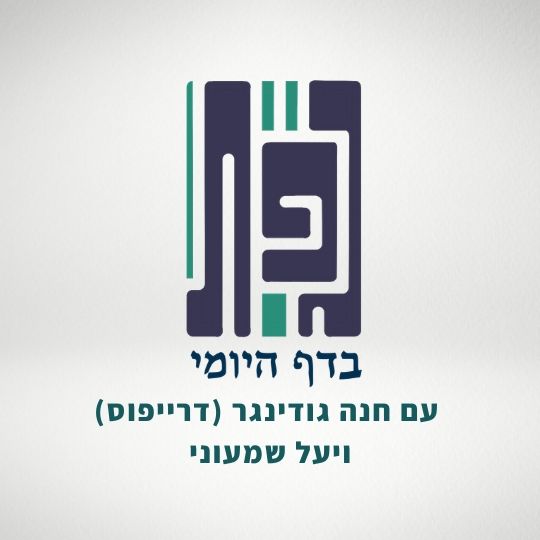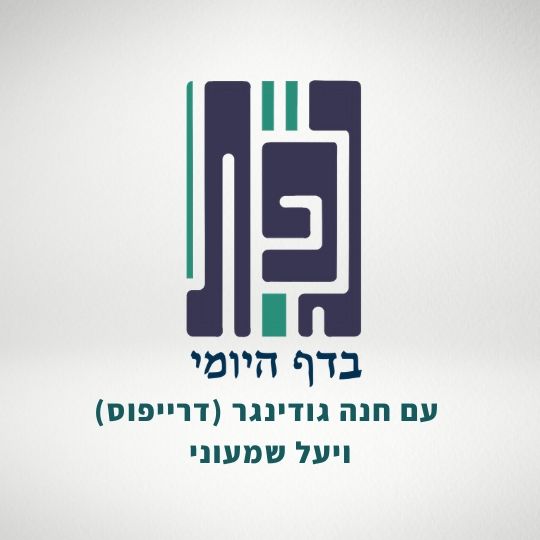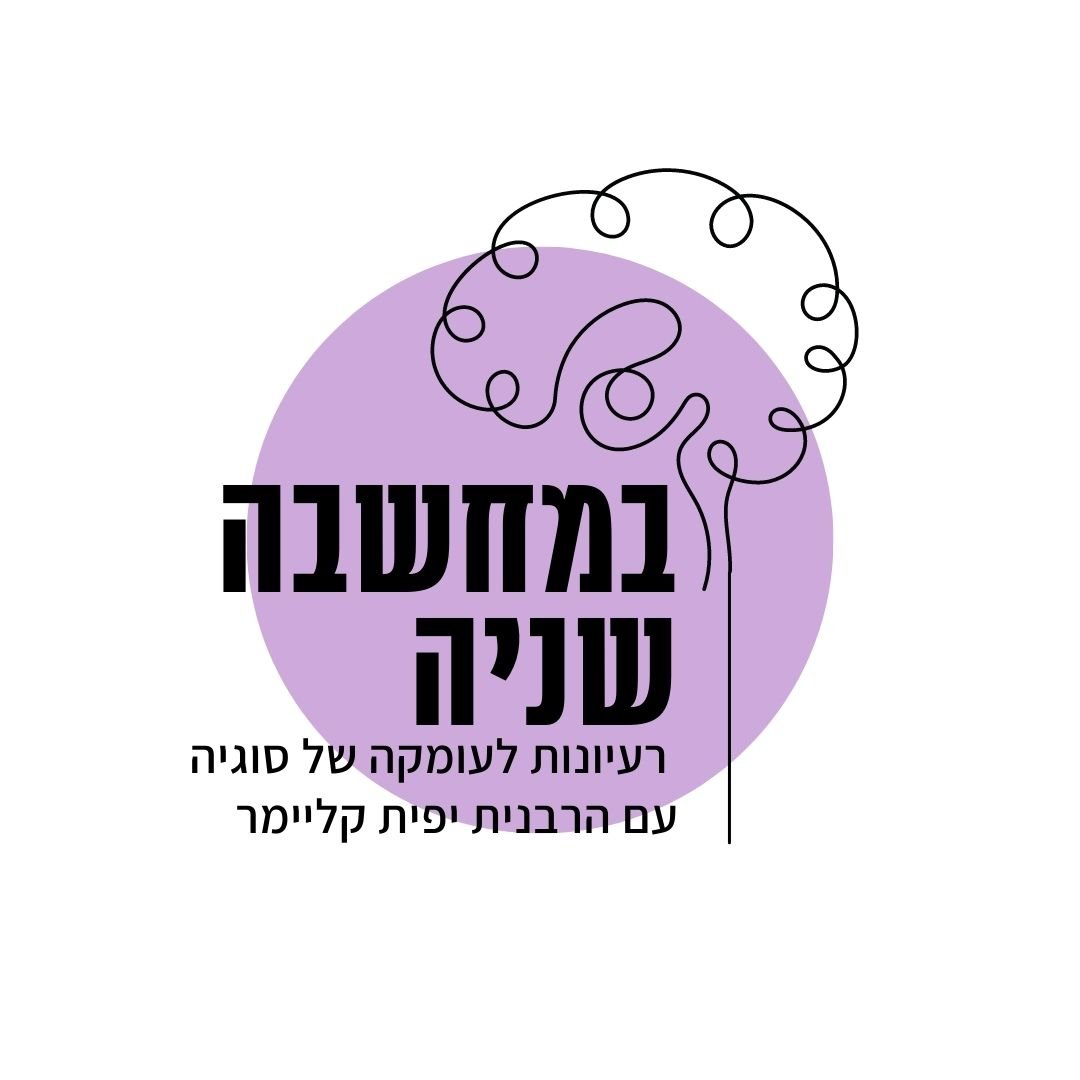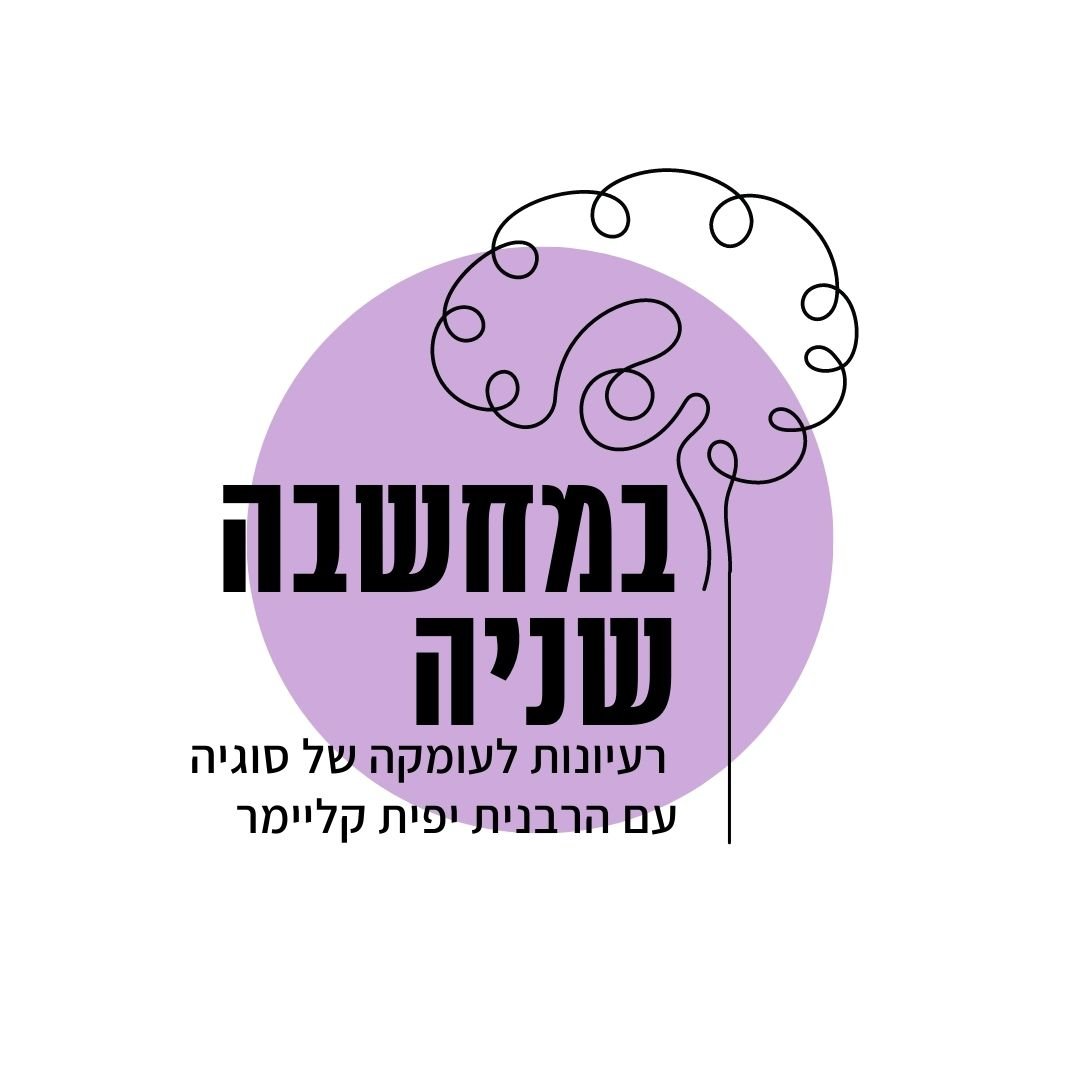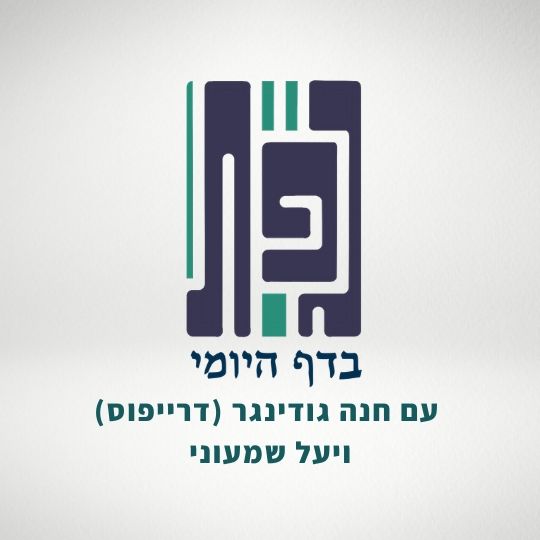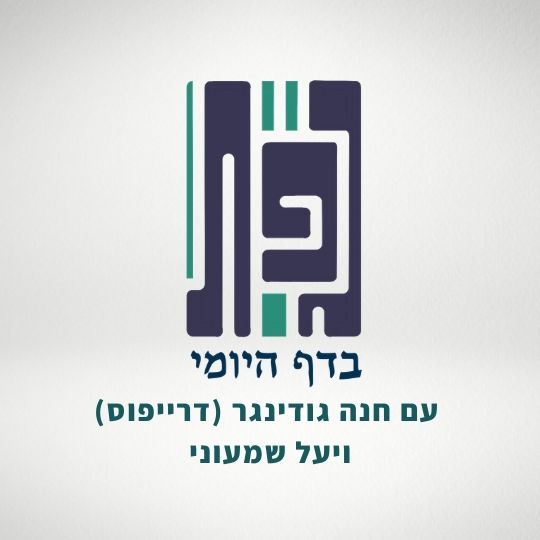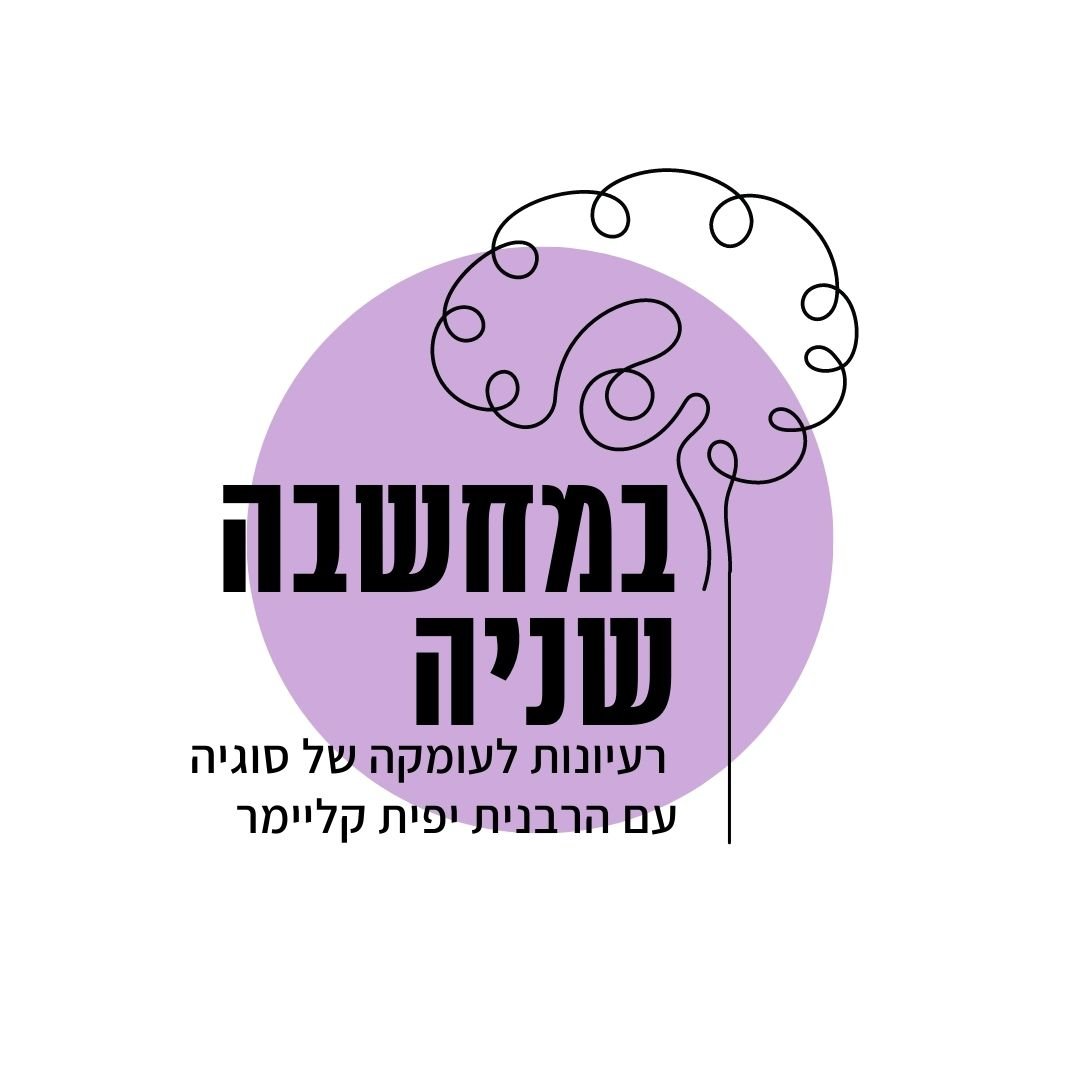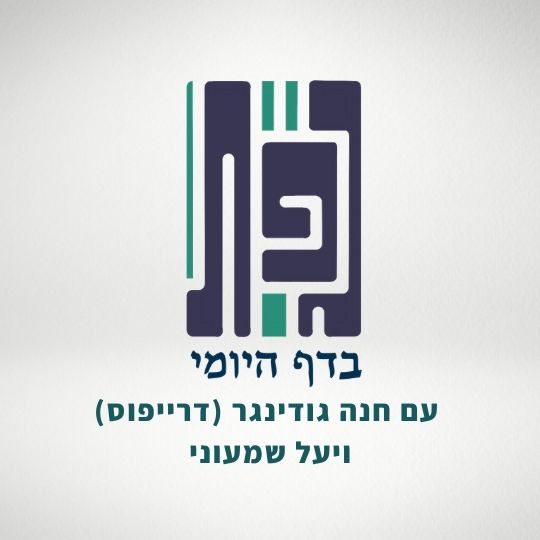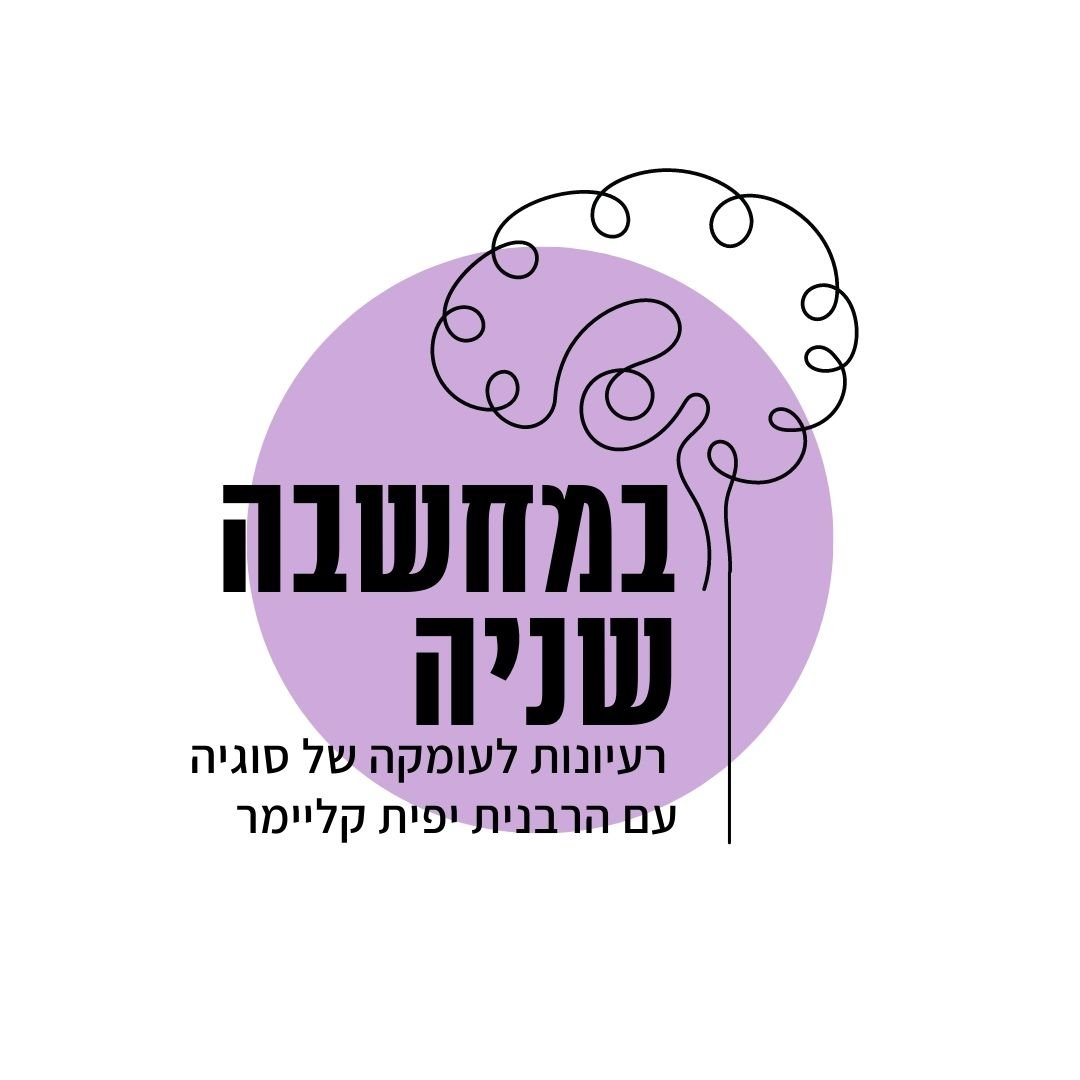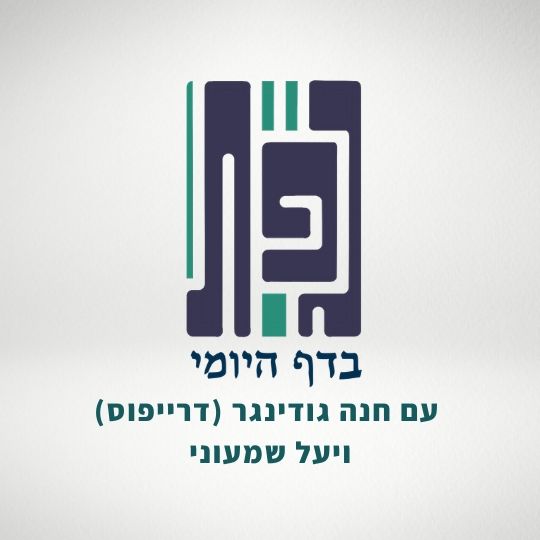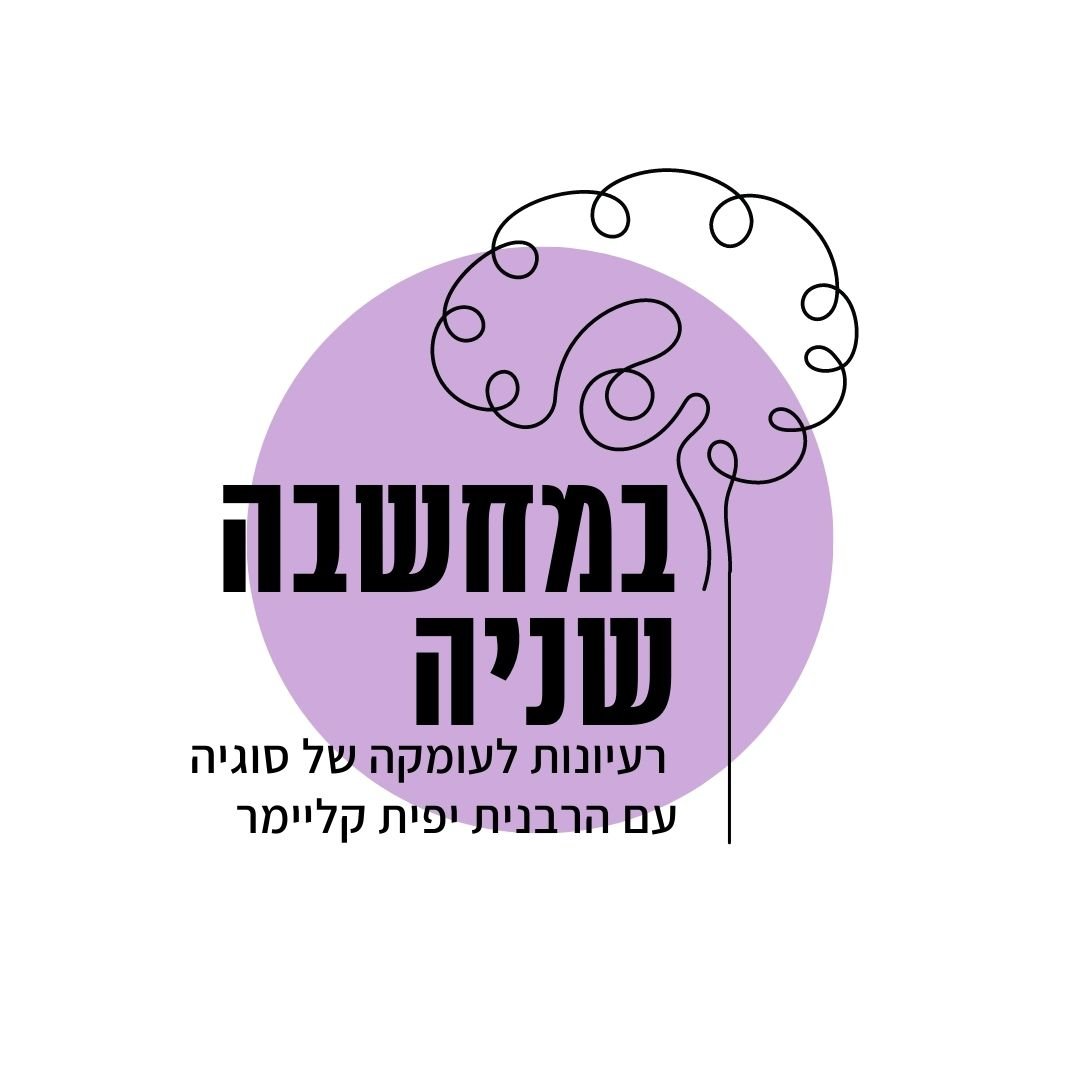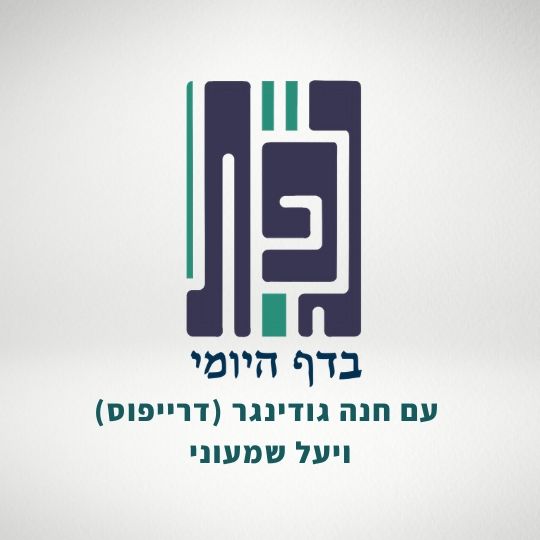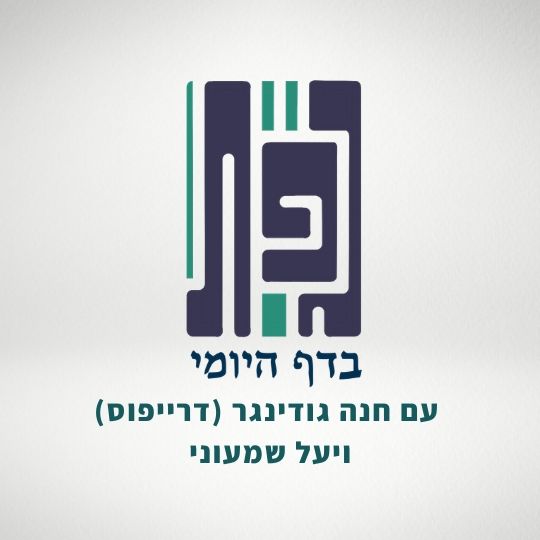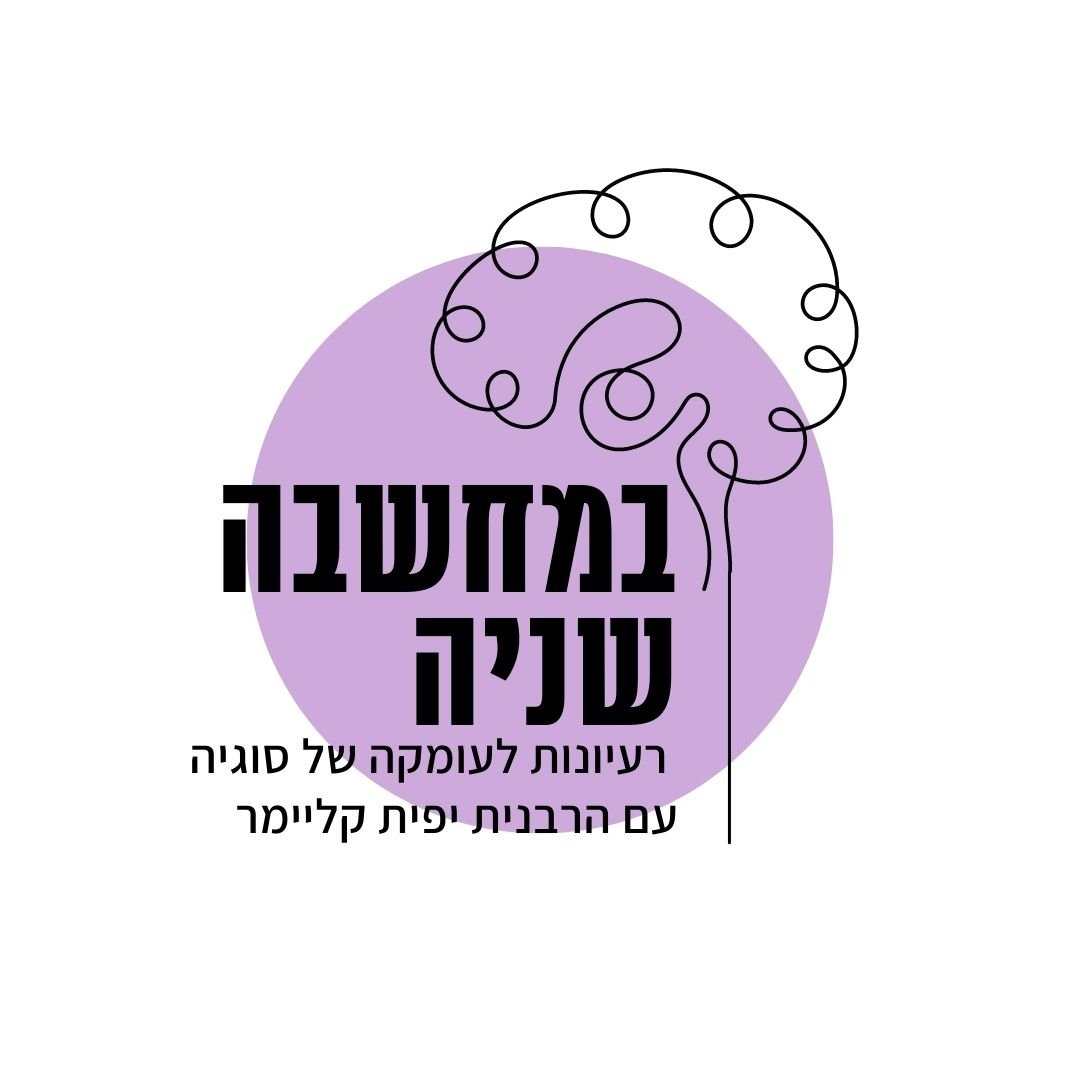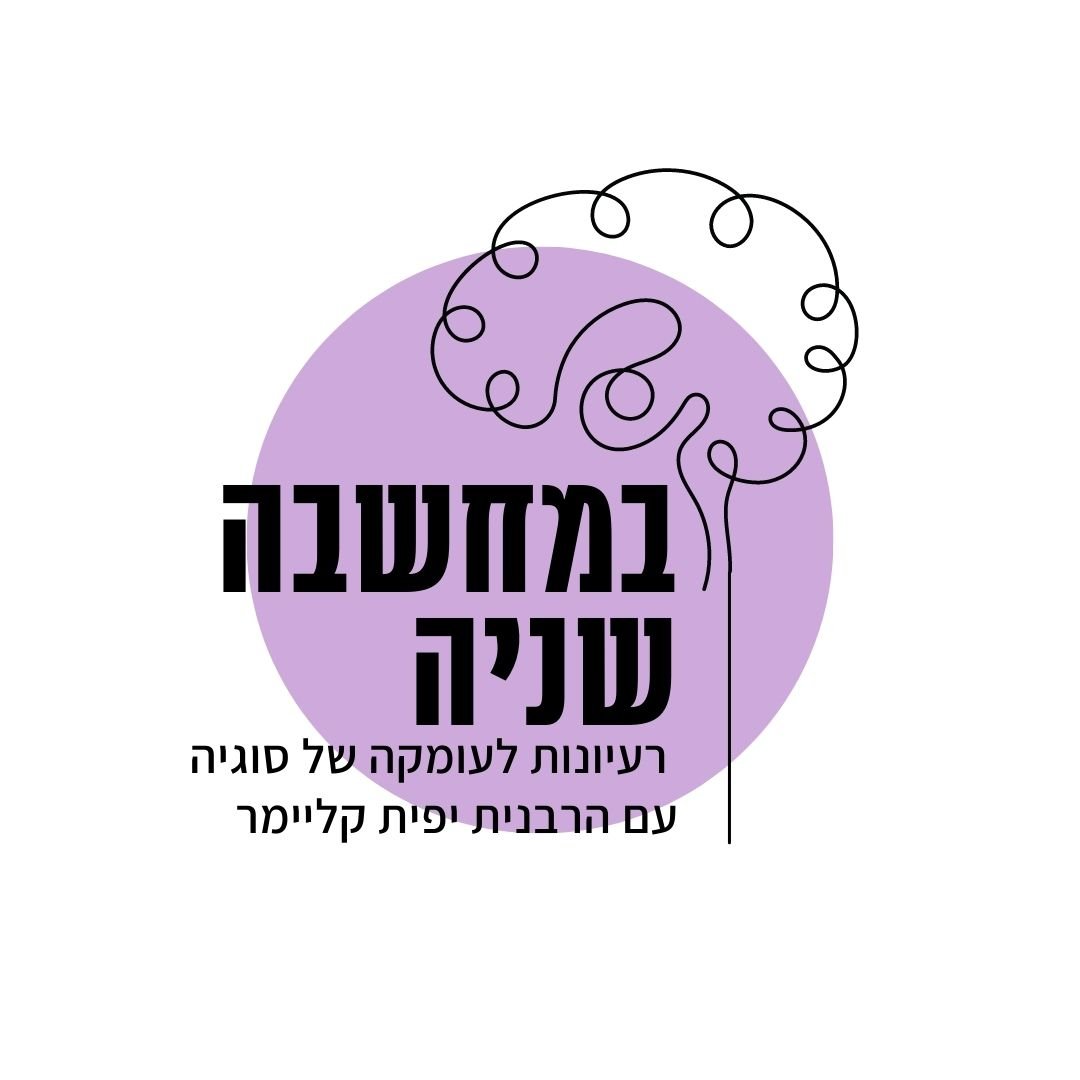גיטין ט
לְעוֹלָם הוּא בֶּן חוֹרִין, עַד שֶׁיֹּאמַר ״כֹּל נְכָסַיי נְתוּנִין לִפְלוֹנִי עַבְדִּי חוּץ מֵאֶחָד מֵרִיבּוֹא שֶׁבָּהֶן״.
He always becomes a freeman regardless of the wording of the document, even if the owner reserved land for himself, unless it says in the document: All of my property is given to so-and-so my slave, except for one ten-thousandth of it, as in that case it is possible that the master meant to include the slave in the portion that he is not giving. Consequently, the slave is not emancipated. In any case, according to the opinion of Rabbi Shimon, when the document states: All my property, a distinction is drawn between the emancipated slave and the property, as claimed by Rava.
וְהָאָמַר רַב יוֹסֵף בַּר מִנְיוֹמֵי אָמַר רַב נַחְמָן: אַף עַל פִּי שֶׁקִּילֵּס רַבִּי יוֹסֵי אֶת רַבִּי שִׁמְעוֹן – הֲלָכָה כְּרַבִּי מֵאִיר, דְּתַנְיָא: כְּשֶׁנֶּאְמְרוּ דְּבָרִים לִפְנֵי רַבִּי יוֹסֵי, קָרָא עָלָיו הַמִּקְרָא הַזֶּה: ״שְׂפָתַיִם יִשָּׁק מֵשִׁיב דְּבָרִים נְכוֹחִים״!
The Gemara asks: But didn’t Rav Yosef bar Minyumi say that Rav Naḥman said: Even though Rabbi Yosei praised the ruling of Rabbi Shimon with regard to this issue, the halakha is in accordance with the opinion of Rabbi Meir, the first tanna in that mishna. The Gemara elaborates how Rabbi Yosei bestowed praise. As it is taught in the Tosefta (Pe’a 1:13): When these matters were said by the Sages before Rabbi Yosei, he recited this verse about him: “He kisses the lips that give the right answer” (Proverbs 24:26). Despite this praise, the halakha is not in accordance with the opinion of Rabbi Shimon.
וּמִי אָמַר רַב נַחְמָן הָכִי? וְהָאָמַר רַב יוֹסֵף בַּר מִנְיוֹמֵי אָמַר רַב נַחְמָן: שְׁכִיב מְרַע שֶׁכָּתַב כׇּל נְכָסָיו לְעַבְדּוֹ, וְעָמַד – חוֹזֵר בַּנְּכָסִים, וְאֵינוֹ חוֹזֵר בָּעֶבֶד.
With regard to Rav Adda bar Mattana’s proof, the Gemara asks: And did Rav Naḥman actually say this, that we do not divide the statement? But didn’t Rav Yosef bar Minyumi say that Rav Naḥman said: With regard to a person on his deathbed who wrote all of his property to his slave, and afterward he recuperated and arose from his illness, he can retract his transfer of property with regard to the gift of the property to the slave, but he cannot retract his transfer with regard to the emancipation of the slave.
חוֹזֵר בַּנְּכָסִים – מַתְּנַת שְׁכִיב מְרַע הוּא, וְאֵינוֹ חוֹזֵר בָּעֶבֶד – שֶׁהֲרֵי יָצָא עָלָיו שֵׁם בֶּן חוֹרִין!
The Gemara clarifies: He can retract the transfer of the property, as it is the gift of a person on his deathbed. By rabbinic decree, no formal act of acquisition is required for a gift of this kind, as it was given based on the assumption that the owner is about to die. If he does survive, the gift is canceled. But he cannot retract the transfer with regard to the emancipation of the slave, as it has been publicized about the slave that he has the status of a freeman. This shows that Rav Naḥman accepts the principle that we divide the statement, as one portion of this document is accepted while the other part is rejected.
אֶלָּא אָמַר רַב אָשֵׁי: הָתָם הַיְינוּ טַעְמָא, מִשּׁוּם דְּלָאו כְּרוּת גִּיטָּא הוּא.
Rather, Rav Ashi said: There, where Rav Naḥman ruled in accordance with the opinion of Rabbi Meir, he did not do so because he holds that we do not divide the statement, as this is not the issue in dispute. Instead, this is the reason: Because it is not a document that fully severs the ownership of the slave. A bill of manumission must fully sever the bond between slave and master. Since the master left over some property, which may include the slave, for himself, the bill of manumission does not fully sever their relationship. However, with regard to the basic issue of whether or not we divide a single statement, Rav Naḥman agrees with Rava that we do divide a statement.
אִם יֵשׁ עָלָיו עוֹרְרִין, יִתְקַיֵּים בְּחוֹתְמָיו: עַרְעָר כַּמָּה? אִילֵימָא עַרְעָר חַד, וְהָאָמַר רַבִּי יוֹחָנָן: דִּבְרֵי הַכֹּל אֵין עַרְעָר פָּחוֹת מִשְּׁנַיִם!
§ The mishna teaches that if there are those who contest a bill of divorce that was brought within Eretz Yisrael, where it is not necessary to state the declaration: It was written in my presence and it was signed in my presence, it should be ratified through its signatories. The Gemara asks: How many people raise this contestation? If we say that this contestation is by one person, who claims that the bill of divorce is a forgery, but didn’t Rabbi Yoḥanan say: Everyone agrees that a contestation to a document may be brought by no fewer than two people?
וְאֶלָּא עַרְעָר תְּרֵי? תְּרֵי וּתְרֵי נִינְהוּ, מַאי חָזֵית דְּסָמְכַתְּ אַהָנֵי, סְמוֹךְ אַהָנֵי! אֶלָּא עַרְעָר דְּבַעַל.
But rather, you will say that the contestation involves two people claiming that the bill of divorce is a forgery, who are subsequently countered by two others who ratify it. If so, they are two and two. What did you see that you relied on these witnesses? Rely instead on these. Why does the court accept the testimony of the witnesses who ratify the bill of divorce rather than those who contest its validity? The Gemara therefore concludes that this is referring to a case in which one person contests, however, the contestation is raised by the husband himself, who claims that the bill of divorce is a forgery.
מַתְנִי׳ הַמֵּבִיא גֵּט מִמְּדִינַת הַיָּם, וְאֵינוֹ יָכוֹל לוֹמַר ״בְּפָנַי נִכְתַּב וּבְפָנַי נֶחְתַּם״, אִם יֵשׁ עָלָיו עֵדִים – יִתְקַיֵּים בְּחוֹתְמָיו.
MISHNA: With regard to one who brings a bill of divorce from a country overseas and is unable to say: It was written in my presence and it was signed in my presence, if the bill of divorce has witnesses signed on it, it should be ratified through its signatories. The witnesses themselves or someone who recognizes their signatures should ratify it, in the manner of typical documents.
אֶחָד גִּיטֵּי נָשִׁים וְאֶחָד שִׁחְרוּרֵי עֲבָדִים, שָׁווּ לַמּוֹלִיךְ וְלַמֵּבִיא, וְזוֹ אַחַת מִן הַדְּרָכִים שֶׁשָּׁווּ גִּיטֵּי נָשִׁים לְשִׁחְרוּרֵי עֲבָדִים.
Both bills of divorce and bills of manumission are the same with regard to the halakhot of delivering the document from Eretz Yisrael to a country overseas and with regard to bringing it from a country overseas to Eretz Yisrael, i.e., the agents for both types of documents must declare that it was written and signed in their presence, and their statement is accepted. And this is one of the ways in which the halakhot of bills of divorce are equal to the halakhot of bills of manumission.
גְּמָ׳ מַאי ״אֵינוֹ יָכוֹל לוֹמַר״? אִילֵימָא חֵרֵשׁ, חֵרֵשׁ בַּר אֵתוֹיֵי גִּיטָּא הוּא?! וְהָתְנַן: הַכֹּל כְּשֵׁרִין לְהָבִיא אֶת הַגֵּט, חוּץ מֵחֵרֵשׁ שׁוֹטֶה וְקָטָן!
GEMARA: The Gemara asks: What is the meaning of the statement: He is unable to say? If we say that this is referring to a deaf-mute, is a deaf-mute fit to bring a bill of divorce? But didn’t we learn in a mishna (23a): Anyone is fit to serve as an agent to bring a bill of divorce to a woman except for a deaf-mute, an imbecile, and a minor, all of whom may not be appointed as agents at all, as they are not intellectually competent according to halakha?
אָמַר רַב יוֹסֵף: הָכָא בְּמַאי עָסְקִינַן – כְּגוֹן שֶׁנְּתָנוֹ לָהּ כְּשֶׁהוּא פִּיקֵּחַ, וְלֹא הִסְפִּיק לוֹמַר ״בְּפָנַי נִכְתַּב וּבְפָנַי נֶחְתַּם״ עַד שֶׁנִּתְחָרֵשׁ.
Rav Yosef said: With what are we dealing here? This is a case where the agent gave the bill of divorce to her when he was halakhically competent, but he did not manage to say: It was written in my presence and it was signed in my presence, before he became a deaf-mute. In other words, although at the time he was appointed he was fit to be appointed as an agent, he is currently unable to say anything.
אֶחָד גִּיטֵּי נָשִׁים וְאֶחָד שִׁיחְרוּרֵי עֲבָדִים: תָּנוּ רַבָּנַן: בִּשְׁלֹשָׁה דְּרָכִים שָׁווּ גִּיטֵּי נָשִׁים לְשִׁיחְרוּרֵי עֲבָדִים: שָׁווּ לַמּוֹלִיךְ וְלַמֵּבִיא; וְכׇל גֵּט שֶׁיֵּשׁ עָלָיו עֵד כּוּתִי – פָּסוּל, חוּץ מִגִּיטֵּי נָשִׁים וְשִׁחְרוּרֵי עֲבָדִים; וְכׇל הַשְּׁטָרוֹת
§ The mishna teaches that both bills of divorce and bills of manumission are the same in that the agent who brings them is required to say: It was written in my presence and it was signed in my presence. The Sages taught: In three ways the halakhot of bills of divorce are equal to the halakhot of bills of manumission: They are equal with regard to one who delivers and one who brings, i.e., if one takes a bill of divorce or a bill of manumission to a country overseas from Eretz Yisrael, or if he brings it from there, he is required to testify that it was written and signed in his presence. And any document that has a Samaritan witness signed on it is invalid, except for bills of divorce and bills of manumission, as Samaritan witnesses are permitted to serve as witnesses for these documents. And with regard to all documents
הָעוֹלִים בְּעַרְכָּאוֹת שֶׁל גּוֹיִם, אַף עַל פִּי שֶׁחוֹתְמֵיהֶן גּוֹיִם – כְּשֵׁירִין, חוּץ מִגִּיטֵּי נָשִׁים וְשִׁחְרוּרֵי עֲבָדִים. וּכְדִבְרֵי רַבִּי מֵאִיר – בְּאַרְבָּעָה: הָאוֹמֵר ״תֵּן גֵּט זֶה לְאִשְׁתִּי, וּשְׁטַר שִׁחְרוּר זֶה לְעַבְדִּי״, רָצָה לַחֲזוֹר בִּשְׁנֵיהֶם – יַחְזוֹר, דִּבְרֵי רַבִּי מֵאִיר.
that are produced in gentile courts [arkaot], even though their signatories are gentiles, they are valid, except for bills of divorce and bills of manumission. These documents are not valid when prepared by gentiles. And according to the statement of Rabbi Meir, bills of divorce and manumission are equal in four ways, the three aforementioned halakhot and also with regard to a man who says: Give this bill of divorce to my wife, or: Give this bill of manumission to my slave. They are equal in that if he desires to retract his instruction with regard to both of these documents, before they have reached the woman or slave, he can retract. This is the statement of Rabbi Meir.
בִּשְׁלָמָא לְרַבָּנַן, מִנְיָנָא לְמַעוֹטֵי הָא דְּרַבִּי מֵאִיר. אֶלָּא לְרַבִּי מֵאִיר, מִנְיָנָא לְמַעוֹטֵי מַאי?
The Gemara asks: Granted, according to the opinion of the Rabbis, they state the number three to exclude this opinion of Rabbi Meir, by emphasizing that there are only three ways, not four. However, according to the opinion of Rabbi Meir, what does the number four serve to exclude? Wouldn’t it have been enough to say that Rabbi Meir adds another case?
לְמַעוֹטֵי הָא דְּתַנְיָא: עֵדִים שֶׁאֵין יוֹדְעִים לַחְתּוֹם, מְקָרְעִין לָהֶם נְיָיר חָלָק, וּמְמַלְּאִים אֶת הַקְּרָעִים דְּיוֹ.
The Gemara answers: The Sages mention this number to exclude that which is taught in a baraita: With regard to witnesses who do not know how to sign, i.e., they do not know how to write their names, one tears blank paper for them, meaning that a stencil of their names is fashioned from blank paper and placed on the bill of divorce. And the witnesses fill in the gaps with ink so that their names appear on the document.
אָמַר רַבָּן שִׁמְעוֹן בֶּן גַּמְלִיאֵל: בַּמֶּה דְּבָרִים אֲמוּרִים – בְּגִיטֵּי נָשִׁים, אֲבָל שִׁחְרוּרֵי עֲבָדִים וּשְׁאָר כׇּל הַשְּׁטָרוֹת, אִם יוֹדְעִין לִקְרוֹת וְלַחְתּוֹם – חוֹתְמִין, וְאִם לָאו – אֵין חוֹתְמִין.
Rabban Shimon ben Gamliel said: In what case is this statement said? It is said with regard to bills of divorce. However, with regard to bills of manumission and all other documents, if the witnesses know how to read and sign, they sign, and if not, they do not sign. Rabbi Meir agrees with the opinion of Rabban Shimon ben Gamliel that bills of divorce and bills of manumission are different with regard to this issue, and he mentioned the number to exclude the possibility that the halakha stated by the first tanna of this baraita applies to both types of documents.
קְרִיָּיה מַאן דְּכַר שְׁמַיהּ? חַסּוֹרֵי מְחַסְּרָא וְהָכִי קָתָנֵי: עֵדִים שֶׁאֵין יוֹדְעִין לִקְרוֹת – קוֹרִין לִפְנֵיהֶם וְחוֹתְמִין, וְשֶׁאֵין יוֹדְעִין לַחְתּוֹם – מְקָרְעִין לָהֶם.
With regard to Rabban Shimon ben Gamliel’s statement, the Gemara asks: Reading, who mentioned anything about it? Why does Rabban Shimon ben Gamliel mention a need for the witnesses to be able to read when the discussion is about a witness who does not know how to sign? The Gemara answers: The baraita is incomplete, and this is what it is teaching: If witnesses do not know how to read, then one reads in their presence and they sign. And if they do not know how to sign, then one tears paper for them and they sign. Once the baraita is emended, it is clear that Rabban Shimon ben Gamliel was responding to the statement of the previous tanna.
וְתוּ לֵיכָּא?! וְהָאִיכָּא: הָאוֹמֵר ״תְּנוּ גֵּט זֶה לְאִשְׁתִּי, וּשְׁטַר שִׁחְרוּר זֶה לְעַבְדִּי״, וּמֵת – לֹא יִתְּנוּ לְאַחַר מִיתָה, ״תְּנוּ מָנֶה לִפְלוֹנִי״, וּמֵת – יִתְּנוּ לְאַחַר מִיתָה.
The Gemara asks: And is there nothing else that can be added to the list of ways in which bills of divorce and bills of manumission are equal? But isn’t there a case taught in the mishna (13a): If a person on his deathbed says: Give this bill of divorce to my wife, or this bill of manumission to my slave, and he dies, they should not give the bill after his death. However, if he said: Give one hundred dinars to so-and-so, and he dies, they should give it after his death. Apparently, this is another halakha in which bills of divorce and bills of manumission share equal status.
כִּי קָתָנֵי, מִילְּתָא דְּלֵיתַיהּ בִּשְׁטָרוֹת, מִילְּתָא דְּאִיתַיהּ בִּשְׁטָרוֹת לָא קָתָנֵי.
The Gemara answers: When the baraita teaches the ways in which bills of divorce and bills of manumission are equal, it is referring only to a matter that does not apply to typical documents and it does not teach any matter that is equally applicable to typical documents.
דִּשְׁלַח רָבִין מִשְּׁמֵיהּ דְּרַבִּי אֲבָהוּ: הֱווּ יוֹדְעִין, שֶׁשָּׁלַח רַבִּי אֶלְעָזָר לַגּוֹלָה מִשּׁוּם רַבֵּינוּ: שְׁכִיב מְרַע שֶׁאָמַר ״כִּתְבוּ וּתְנוּ מָנֶה לִפְלוֹנִי״, וּמֵת – אֵין כּוֹתְבִין וְנוֹתְנִין,
The Gemara explains: As Ravin sent from Eretz Yisrael in the name of Rabbi Abbahu: You should know that Rabbi Elazar sent this teaching to the Diaspora, i.e., Babylonia, in the name of our teacher, Rabbi Yoḥanan: With regard to the case of a person on his deathbed who says: Write a deed of transfer and give with it one hundred dinars to so-and-so, and then dies before they had the opportunity to write the document, one does not write and give the document. Why not?
שֶׁמָּא לֹא גָּמַר לְהַקְנוֹתוֹ אֶלָּא בִּשְׁטָר, וְאֵין שְׁטָר לְאַחַר מִיתָה.
The Gemara explains: Perhaps he resolved to transfer these one hundred dinars to him only with a deed of transfer, and a deed of transfer of property is not written after the death of the owner. This shows that other documents are also not written after one’s death, which means that this halakha is not specific to bills of divorce and bills of manumission. Therefore, it is not listed among the ways in which these two documents are similar.
וְהָאִיכָּא לִשְׁמָהּ?
The Gemara raises another difficulty: But isn’t there the halakha that both bills of divorce and bills of manumission must be written for her sake, i.e., for the sake of the particular woman or slave to whom they are given? Why isn’t this halakha included in the list?
בִּשְׁלָמָא לְרַבָּה, הַיְינוּ מוֹלִיךְ וּמֵבִיא. אֶלָּא לְרָבָא, קַשְׁיָא!
The Gemara comments: Granted, according to the opinion of Rabba, this is included in the statement: The two documents are similar with regard to the halakhot of delivering and bringing, as he maintains that this requirement to write the document for the sake of the recipient is the primary reason why the agents must state that it was written and signed in their presence. However, according to the opinion of Rava, who holds that the reason for this statement is to ratify the bill of divorce, this is difficult.
וְתוּ: בֵּין לְרַבָּה בֵּין לְרָבָא, הָאִיכָּא מְחוּבָּר! כִּי קָתָנֵי פְּסוּלָא דְרַבָּנַן, דְּאוֹרָיְיתָא לָא קָתָנֵי.
And furthermore, both according to the opinion of Rabba and according to the opinion of Rava, there is the case of bills which were written and signed while they were attached to the ground, e.g., on a leaf attached to a tree, which invalidates both bills of divorce and bills of manumission. The Gemara explains: When the baraita teaches its list it is referring solely to issues that cause the documents to be rendered invalid by rabbinic law. It does not teach cases involving invalidation by Torah law. Since these two cases, i.e., documents not written for the recipient’s sake or when they are attached to the ground, are not valid by Torah law, the baraita did not mention these cases.
וְהָא עַרְכָּאוֹת שֶׁל גּוֹיִם, דִּפְסוּלָא דְאוֹרָיְיתָא הוּא, וְקָתָנֵי! בְּעֵדֵי מְסִירָה, וּכְרַבִּי אֶלְעָזָר דְּאָמַר: עֵדֵי מְסִירָה כָּרְתִי.
The Gemara challenges this response: But there is the example of documents written in gentile courts, which is an invalidation of documents that applies by Torah law, and yet the baraita teaches this halakha. The Gemara answers: This is referring to a bill of divorce that was given with valid witnesses who observe the transmission of a legal document, and this is in accordance with the opinion of Rabbi Elazar, who says in a mishna (10b): Witnesses of the transmission of a bill of divorce effect the divorce. In his opinion, the effectiveness of the document depends on the witnesses who observe its transmission, not those who sign the bill of divorce. Consequently, a bill of divorce that was signed in a gentile court is rendered invalid by rabbinic law.
וְהָא מִדְּקָתָנֵי סֵיפָא, רַבִּי שִׁמְעוֹן אוֹמֵר: אַף אֵלּוּ כְּשֵׁירִין, וְאָמַר רַבִּי זֵירָא: יָרַד רַבִּי שִׁמְעוֹן לְשִׁיטָתוֹ שֶׁל רַבִּי אֶלְעָזָר, דְּאָמַר עֵדֵי מְסִירָה כָּרְתִי; מִכְּלָל דְּתַנָּא קַמָּא סָבַר – לָא!
The Gemara raises a difficulty: But from the fact that it teaches in the latter clause of that mishna that Rabbi Shimon says: Even these, bills of divorce and bills of manumission, are valid, and Rabbi Zeira said: Rabbi Shimon accepted the opinion of Rabbi Elazar, who said that witnesses of the transmission of the bill of divorce effect the divorce, one can learn by inference that the first tanna does not hold in accordance with the opinion of Rabbi Elazar. Instead, he holds that the witnesses who sign effect a divorce. Yet even so, this tanna listed the cases where bills of divorce from gentile courts are invalidated, despite the fact that they are invalid by Torah law.

